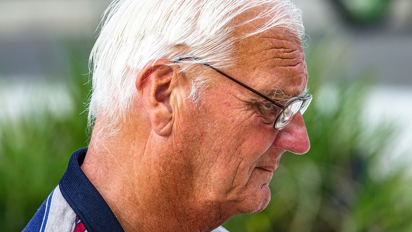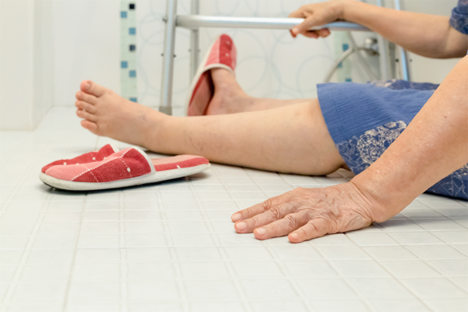|
As we age, we naturally start to experience memory loss. But when does normal memory loss cross over into Alzheimer’s or Dementia? The early signs of both disorders are often dismissed as “senior moments.” But if your loved one struggles with memory loss, mood swings or confusion, it may be signs of Alzheimer’s or Dementia. Look for these 10 warning signs. Repeated Memory LossOccasionally forgetting doctor’s appointments or names is a normal part of aging, but people with Alzheimer’s or Dementia frequently experience memory loss. It may start as forgetting recently learned information, forgetting important dates or asking for the same information repeatedly. Difficulty Problem SolvingDoes it seem to take your loved one longer to do familiar tasks? Were they once able to balance their checkbook, but now struggle understanding the numbers? A person with Alzheimer’s or Dementia may have difficulty concentrating and following plans or understanding numbers. Inability to Complete Familiar TasksAlzheimer’s or Dementia can cause your loved one to struggle with routine tasks. It can be as simple as forgetting directions to a familiar place, trouble preparing meals or remembering rules to a favorite game. Confusion with Time or PlaceOccasional disorientation is common, as long as the person later remembers. People with Alzheimer’s or Dementia have difficulty keeping track of dates. They may think it’s a different day or year, or forget where they are and how they got there. Vision ProblemsFor some people, vision problems can be another sign of Alzheimer’s or Dementia. Difficulty reading, judging distance or determining color or contrast are all symptoms. If the person doesn’t have any other vision-related health issues, Alzheimer’s or Dementia could be to blame. Problems with LanguageWe all occasionally have trouble finding the right word, but a person with Alzheimer’s or Dementia will stumble with language frequently. They may forget common words and use odd words in their place. They may trail off in the middle of a conversation or repeat themselves. Frequently Misplacing ThingsLosing keys every now and then is common, but Alzheimer’s and Dementia interfere with a person’s ability to remember where they placed items. If your loved one frequently loses things and can’t retrace their steps, that may be a sign. They may also leave things in seemingly random places, then forget that they put them there. Decreased or Poor JudgmentPeople with Alzheimer’s or Dementia may struggle with decision-making and judgment calls. They may fall prey to telemarketing schemes or other money scams. Social WithdrawalIf your loved one seems to have no interest in favorite activities or hobbies, that could be a sign of Alzheimer’s or Dementia. They may start to remove themselves from favorite hobbies, social activities, work or sports. They may start keeping to themselves more and more. Changes in Mood and PersonalityAlzheimer’s and Dementia can cause extreme mood and personality changes. People with Alzheimer’s or Dementia may become confused, suspicious, depressed, fearful or anxious, especially in unfamiliar situations. They may also experience rapid mood swings. If you suspect your loved one is suffering from Alzheimer’s or Dementia, it’s important to talk to their doctor as soon as possible. If Alzheimer’s or Dementia is detected early, your loved one can receive the best benefit from treatments. You can then take steps for make an action plan for deciding on treatments, finding a caregiver and taking preventative steps. Sources: http://www.alz.org/alzheimers_disease_10_signs_of_alzheimers.asp https://www.fightdementia.org.au/national/about-dementia/how-can-i-find-out-more/warning-signs-of-dementi Martin Luther Campus is part of the Ebenezer family of Lutheran Senior Care Communities. We provide transitional care and assisted living apartments for seniors in Bloomington. We also have adult day clubs and memory care programs for seniors living at home. We’re located at 1401 East 100th St. Bloomington, MN. Are you interested in transitioning to assisted living or do you have a loved one that needs assisted living? Call us at 952.888.7751
9 Comments
Every year, three million older people are treated in emergency departments for fall injuries, with around 55% of these falls occurring inside the house. According to a study by Gill et al, older people living in dwellings without stairs most often fall in five key areas: hallways (10%), bathrooms (13%), kitchens (19%), bedrooms (30%) and living rooms. If live alone, guard yourself against falls by ensuring your home is as fall-proof as possible. Flooring is Key Many seniors slip and fall because of slippery surfaces. Marble can get very slippery when wet but is also very tough on bones and muscles if a fall should ensue. Carpet will give you a much better grip. If you have asthma or dust allergies and you prefer hard flooring, wood or laminate are preferable to natural stone, ceramic, or porcelain tiles. Talk to a builder about specific anti-slip material as well; some of the most efficient options include rubber, cork, and bamboo. Home Layouts MatterIt is important to take a long hard look at your home and to identify possible triggers for trips and falls. These can include low-lying furniture and decorative pieces. The layout of your home should suit your specific needs. For instance, if you have limited mobility, having tall furniture pieces that are within reach of each other will give you something to hold on to. Tidiness is also key. Sometimes even a small item such as a bottle cap or a grandchild’s toy can result in an unpleasant fall, so make sure your floor space is completely clear. For extra safety, ensure you have a telephone in more than one room, or better still, a wearable device, which informs the emergency department if you fall. Avoid hallway rugs and other small sized fabrics that can become a tripping risk. Reducing the PainArthritis.org estimates that around 31 million Americans are affected by osteoarthritis. If you have joint pain, it can be difficult to turn doorknobs, open the water faucet, or sit on/get up from low toilet seats. If you have the budget for it, it is important to make a few changes so as to make day-to-day life easier. These may include installing a raised toilet seat, or raising kitchen equipment so you don’t have to bend over. Other changes are cheap and easy; for instance, if it hurts your joints to use a doorknob, a simple doorknob grip will lessen your burden. To ease stability and comfort when getting in and out of a bath or when getting up from a favorite chair, grab bars are the way to go. Joining Spaces TogetherChanges in level between one room and another can be a major source of falls. It is easy to remedy this, by installing a ramp-type transition between the two rooms. You can either have a transition made or use a ready-made rubber ramp, provided the latter is stable and large enough to cover walkable areas. We have mentioned just a few home ideas to reduce the chances of painful trips and falls, though there are many more you should consider. Good lighting, fixing kitchen and other equipment at suitable heights, and removing steps from the main entrance will enable you to feel more confident. If you find that your balance is off or that you feel weaker than normal, see your doctor to ensure pain, vision, or other problems will not increase the likelihood of falls. At Martin Luther Campus, we take safety seriously. All our facilities are designed to be both comfortable and safe for seniors, to minimize fall risks. Martin Luther Campus is part of the Ebenezer family of Lutheran Senior Care Communities. We provide transitional care and assisted living apartments for seniors in Bloomington. We also have adult day clubs and memory care programs for seniors living at home. We’re located at 1401 East 100th St. Bloomington, MN. Are you interested in transitioning to assisted living or do you have a loved one that needs assisted living? Call us at 952.888.7751
This blog comes from Rachel Wirthlin, MPH, Nutrition & Dietetics Student U of MN An apple a day keeps the doctor away, but how do you keep muscle pain at bay? Eating protein can not only help you build muscle, but also help relieve muscle soreness post workout. Healthy eating is very important as you age!Eating a wide variety of fruits and vegetables, whole grains, proteins, dairy products, and staying hydrated helps your body fight off infection, build and maintain muscle, and maintain a healthy body. Protein foods are especially important to maintain and keep your muscles strong. Your body also uses protein to make energy. As you age, your muscles start to deteriorate due to inactivity and as part of the aging process. To decrease the amount of muscle that deteriorates, physical activity and consuming protein foods can help keep muscles strong. What foods are high in protein?A lot of animal products are full of protein. These are foods such as meats, eggs, milk, yogurt, and other dairy products, and seafood. There are also plant based proteins. These include nuts, soy products, peas, and beans. When choosing foods that are high in protein, make sure your meats are lean meats. Plant based proteins tend to also be lower in calories, fats, and cholesterol. Try to incorporate a protein based food with every meal or snack. Ideas can include eggs and toast for breakfast, or adding peanut butter to your oatmeal. For lunch, try to have a type of meat or fish with vegetables. The same can be said for dinner. Or add nuts and nut butters to snacks. Try some cheese with crackers, or peanut butter with an apple. There are many ways you can include protein and keep your body strong and healthy! At Ebenezer, your nutrition matters. Both our assisted living programs and day programs ensure seniors receive proper nutritional food for every meal. Martin Luther Campus is part of the Ebenezer family of Lutheran Senior Care Communities. We provide transitional care and assisted living apartments for seniors in Bloomington. We also have adult day clubs and memory care programs for seniors living at home. We’re located at 1401 East 100th St. Bloomington, MN. Are you interested in transitioning to assisted living or do you have a loved one that needs assisted living? Call us at 952.888.7751.
Eating healthy is important at any age, but it becomes even more important as you age. Many older adults suffer from malnutrition. When trying to eat healthy, follow these tips to improve your quality of life. Calcium and Vitamin DOlder adults need increased calcium and vitamin D to help maintain bone health and strength. It is recommended to have three servings of vitamin D-fortified low-fat or fat-free milk or yogurt each day. Other calcium-rich foods include fortified cereals and fruit juices, dark green leafy vegetables and canned fish with soft bones. If you take a calcium supplement or multivitamin, choose one that contains vitamin D. Other important nutrients for older adults include: Vitamin B12, Fiber, and Potassium. Source:https://www.eatright.org/health/wellness/healthy-aging/special-nutrient-needs-of-older-adult Be Active in Your Own WayBeing physically active can help you stay strong and independent as you age, improving quality of life, and reduce the risk of disease and disability. It is important to find an activity that is appropriate for your fitness level. Strive for at least 10 minutes of exercise at a time and increase as tolerable. Include activities that improve balance, increase strength, and reduce your risk of falling such as lifting small weights. Being active will make it easier to enjoy regular activities such as shopping or gardening. If you are not sure about your level of fitness, check with your doctor before starting an intense exercise program or vigorous physical activity. Source: https://www.choosemyplate.gov/older-adult Know Your Food GroupsIt is important to consume well-balanced meals from all of the five food groups (fruit, vegetables, grains, protein, and dairy). Add color to your plate with a variety of fruits and vegetables. Eating all the colors of the rainbow make sure you are consuming all of the essential vitamins and minerals in a healthy diet. Fruits and vegetables can make a great snack in between meals! Source: https://www.nia.nih.gov/health/know-your-food-groups How to Choose Whole GrainsChoosing whole grains provide individuals with more fiber, vitamins, and minerals than refined/ white grain products. Some whole grains include popcorn, brown rice, wild rice, buckwheat, bulgur, and quinoa. These will be listed as such on an ingredient list. To determine whether other grains are whole grains look at the first food on the ingredients list should contain the word "whole," prior to the name of the grain, such as whole wheat, whole oats, or whole grain corn. Ingredients are listed in order by weight from greatest to least. The first ingredient will be in the greatest amount by weight. It is recommended that 50% of the grains consumed are whole grains. Source: https://www.nia.nih.gov/health/know-your-food-groups Food Safety- Important for Aging AdultsFoodborne illness, commonly known as food poisoning, is any illness that is caused by the food you eat. Safe food handling can help reduce your risk of getting sick from food. It is especially important for older adults that are vulnerable to illness and can take longer to recover. Tips:
Source: https://www.fsis.usda.gov/wps/portal/fsis/topics/food-safety-education/get-answers/food-safety-fact-sheets/at-risk-populations/older-adults-and-food-safety/ct_index Use these tips to stay healthy! Martin Luther Campus is part of the Ebenezer family of Lutheran Senior Care Communities. We provide transitional care and assisted living apartments for seniors in Bloomington. We also have adult day clubs and memory care programs for seniors living at home. We’re located at 1401 East 100th St. Bloomington, MN. Are you interested in transitioning to assisted living or do you have a loved one that needs assisted living? Call us at 952.888.7751.
|
Director of Community Relations
Hello friends, my name is Kate and I'd love to share with you ALL of the wonderful things happening at Martin Luther Campus. Be sure to check our Blog, Lifestyle page and Facebook page often to stay updated on the happenings at our community! Archives
November 2023
Categories |
|
telephone |
|
DIRECTIONSimap
|
© 2021 Fairview Health Services
|





 RSS Feed
RSS Feed

